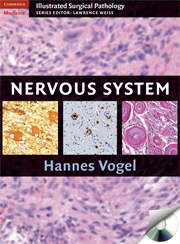Book contents
- Frontmatter
- Contents
- Contributors
- Preface
- Acknowledgments
- 1 Normal Anatomy and Histology of the CNS
- 2 Intraoperative Consultation
- 3 Brain Tumors
- Brain Tumors – An Overview
- Brain Tumor Locations with Respect to Age
- Grading Brain Tumors
- NEUROEPITHELIAL
- TUMORS OF CRANIAL AND PARASPINAL NERVES
- TUMORS OF THE MENINGES
- LYMPHOMAS AND HEMATOPOIETIC NEOPLASMS
- GERM CELL TUMORS
- NONNEOPLASTIC MASSES AND CYSTS
- PATHOLOGY OF THE SELLAR REGION
- METASTATIC NEOPLASMS OF THE CENTRAL NERVOUS SYSTEM
- SKULL AND PARASPINAL NEOPLASMS, NONNEOPLASTIC MASSES, AND MALFORMATIONS
- CNS-RELATED SOFT TISSUE TUMORS
- 4 Vascular and Hemorrhagic Lesions
- 5 Infections of the CNS
- 6 Inflammatory Diseases
- 7 Surgical Neuropathology of Epilepsy
- 8 Cytopathology of Cerebrospinal Fluid
- Index
NONNEOPLASTIC MASSES AND CYSTS
from 3 - Brain Tumors
Published online by Cambridge University Press: 04 August 2010
- Frontmatter
- Contents
- Contributors
- Preface
- Acknowledgments
- 1 Normal Anatomy and Histology of the CNS
- 2 Intraoperative Consultation
- 3 Brain Tumors
- Brain Tumors – An Overview
- Brain Tumor Locations with Respect to Age
- Grading Brain Tumors
- NEUROEPITHELIAL
- TUMORS OF CRANIAL AND PARASPINAL NERVES
- TUMORS OF THE MENINGES
- LYMPHOMAS AND HEMATOPOIETIC NEOPLASMS
- GERM CELL TUMORS
- NONNEOPLASTIC MASSES AND CYSTS
- PATHOLOGY OF THE SELLAR REGION
- METASTATIC NEOPLASMS OF THE CENTRAL NERVOUS SYSTEM
- SKULL AND PARASPINAL NEOPLASMS, NONNEOPLASTIC MASSES, AND MALFORMATIONS
- CNS-RELATED SOFT TISSUE TUMORS
- 4 Vascular and Hemorrhagic Lesions
- 5 Infections of the CNS
- 6 Inflammatory Diseases
- 7 Surgical Neuropathology of Epilepsy
- 8 Cytopathology of Cerebrospinal Fluid
- Index
Summary
AMYLOIDOMA (PRIMARY SOLITARY AMYLOIDOSIS)
Clinical and Radiological Features
Amyloidomas occur more frequently in men between the fifth and seventh decades of life. They are rare mass lesions that occur in many diverse sites including the brain, base of skull, cranial nerves, or spinal epidural space, causing back pain and possibly a compressive myelopathy or radiculopathy. Elsewhere in the brain, they present as single or multiple mass lesions with little or no mass effect on surrounding structures.
There is typically no association with a plasma cell dyscrasia or malignancy since they may possibly originate in the microglial processing of plasma proteins (Cohen et al., 1992); however, because of the occasional involvement of the spinal column by multiple myeloma, diagnostic measures should be taken to exclude systemic or plasma cell dyscrasia. MRI indicates a hypointense lesion on T1- and T2-weighted imaging with contrast enhancement (Figure 3.115a) (Gandhi et al., 2003).
Pathology
Amyloidomas have been described with varying amounts of chronic inflammation as well as in circumstances in which virtually no inflammation is noted. Microscopy typically reveals amorphous or globular acellular masses, birefringent with polarized light (Figure 3.115b). The presence of otherwise typical plasma cells within a mixed chronic inflammatory infiltrate should not be considered suspicious for a plasma cell malignancy. However, if this consideration persists, immunostaining and in situ hybridization may be used to reveal the presence of clonality in the plasma cell infiltrate.
- Type
- Chapter
- Information
- Nervous System , pp. 249 - 262Publisher: Cambridge University PressPrint publication year: 2009

